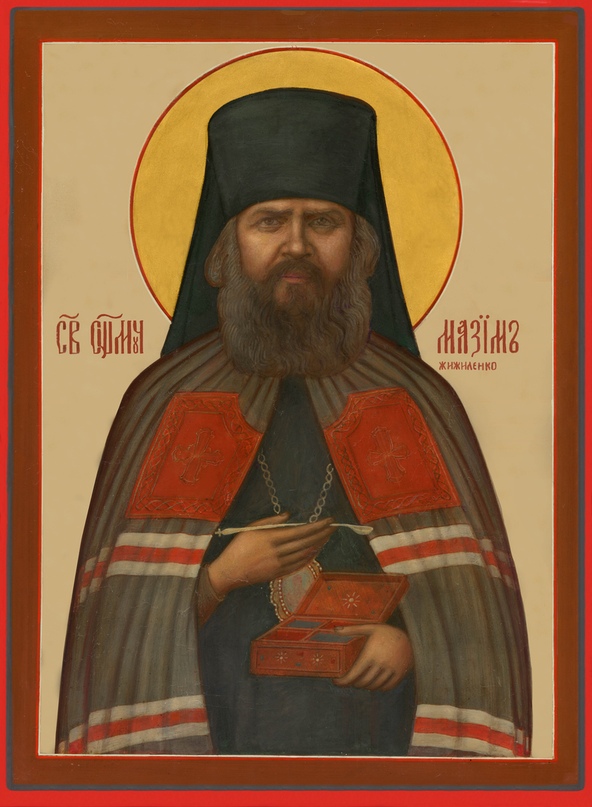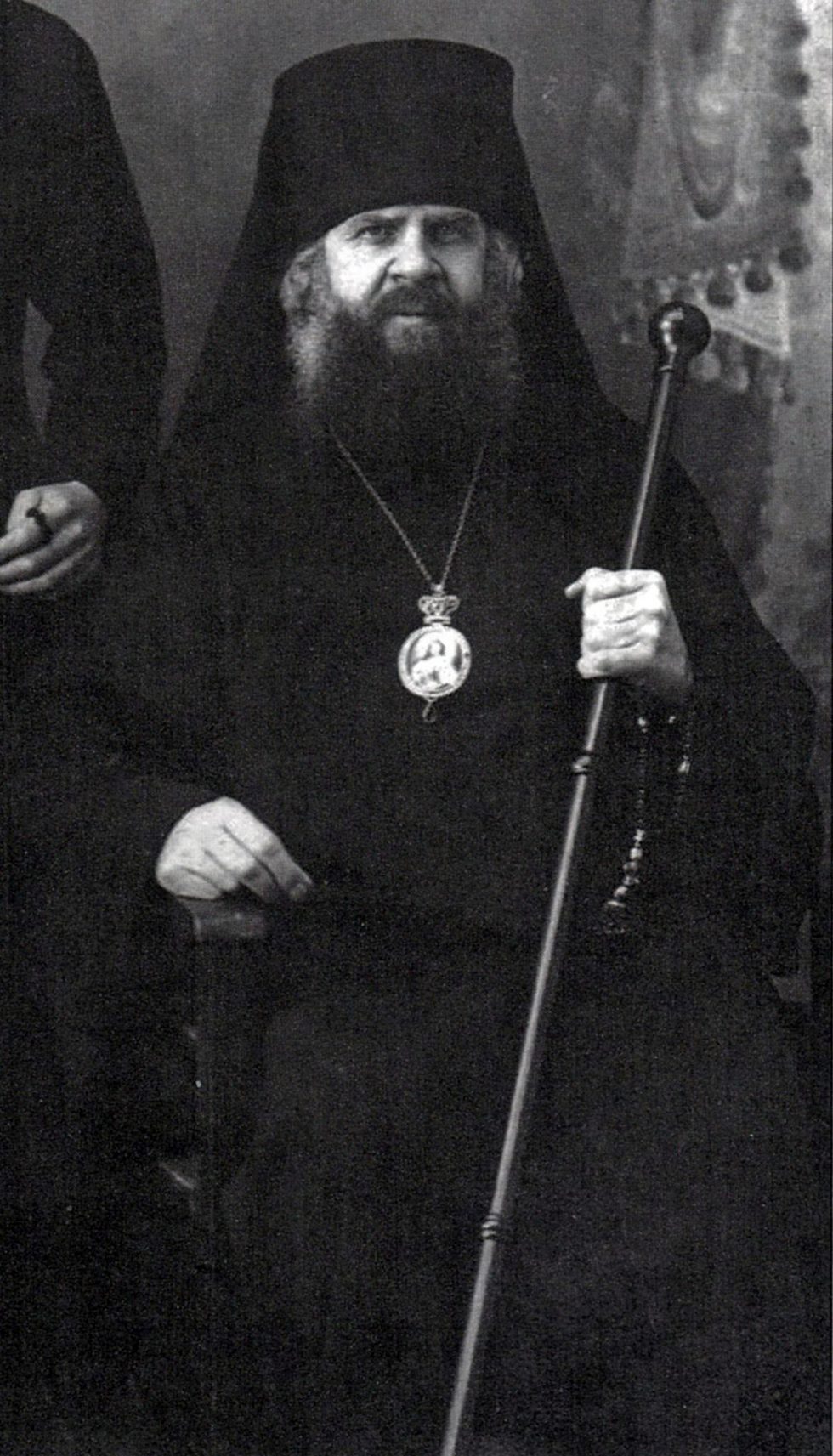Never having seen a proper icon of the Holy Hieromartyr, Maxim of Serpukhov, first bishop of the Catacomb Church in Russia, I was very happy to have quite literally JUST stumbled upon an icon by chance.
As well as posting the icon, his life is posted below.
Holy Hieromartyr, Maxim, pray to God for us!

Michael Alexandrovich Zhizhilenko (the future Catacomb bishop and Saint Maxim of Serpukhov) was the chief physician of the ‘Taganka’ prison in Moscow (in the early-mid 1920s).
In his difficult post he was not only a physician, but also a great master of the heart, a comforter and father. Before him, a physician, not infrequently as before a priest the most inveterate and incorrigible ncriminals confessed, finding for themselves not only comfort, but often also a return to honest life. Many in Moscow knew that he slept on bare boards, that he ate prison food, that he unfailingly distributed all his salary to the prisoners. He acted in this way not only under the Bolsheviks, but earlier as well, under the Imperial (Tsarist) government. In Moscow he was known as “the elder of Taganka”.
Being a deeply religious man, Vladyka Maxim, while still a layman, made the acquaintance of His Holiness Patriarch (Saint) Tikhon, whom he deeply revered. The Patriarch greatly loved Dr. Zhizhilenko and often made use of his advice. Their relationship in time took on the character of the most intimate friendship. In the words of Vladyka Maxim, the Patriarch confided in him his most secret thoughts and feelings.
Thus, for example, in one of their conversations His Holiness expressed to Vladyka Maxim (then still simply a doctor) his painful doubts as to the benefit of further concessions to the Soviet power. In making these concessions, he became more and more convinced, with horror, that the boundary of the ‘political’ demands of the Soviet power lay beyond the bounds of faithfulness to Christ and the Church. And not long before his death the Patriarch expressed the thought that apparently the only way out for the Russian Orthodox Church to preserve her faithfulness to Christ would be, in the near future, to go into the catacombs.
Therefore Patriarch Tikhon blessed Dr. Zhizhilenko to accept secret monasticism and then, in case in the near future the higher church hierarchy were to concede to the Soviet power the spiritual freedom of the Church, to become a secret bishop.
While telling us, physicians imprisoned at Solovki and true ‘Tikhonites,’ of Patriarch Tikhon’s refusal once to bless one of the participants in the White Movement, Vladyka related in detail concerning the extreme caution of Patriarch Tikhon, who did not show to those around him his authentic deepest relationship to questions of politics, but who revealed this in strict confidence to his no less cautious friend, and concerning the immense joy he had in connection with the activity of Metropolitan Anthony (ROCOR) abroad. “How they there well understand everything and do not, apparently, judge me,” the Patriarch once expressed himself with tears, having in mind the activity of the so-called ‘Karlovchany.’

Vladyka Maxim told us in detail of the many attempts to kill Patriarch Tikhon. Once a supposed madman threw himself with a knife upon the Patriarch as he was coming out of the altar. Unexpectedly, however, instead of Patriarch Tikhon someone else came out, and the ‘madman,’ being ‘sanely surprised,’ delivered no wound to the one who came out. Another time, when the cell-attendant of the Patriarch was killed, the murderer ran about the Patriarch’s apartments without noticing Patriarch Tikhon sitting in an armchair. Several attempts to poison His Holiness were made with the aid of medicines sent to him.
Vladyka Maxim also told us of some disagreements he had with Patriarch Tikhon. The chief of these lay in the fact that His Holiness was optimistically inclined, believing that all the terrors of Soviet life could yet pass, and that Russia could still be reborn through repentance. Vladyka Maxim, however, was inclined to a pessimistic view of the events that were occurring and believed that we had already entered into the final days of the apocalyptic period. “Apparently,” Vladyka Maxim concluded, smiling (which happened rarely), “we infected each other a little with our attitudes: I infected him with pessimism, and he me with optimism.”
His Holiness Patriarch Tikhon died on March 25, 1925, being, in the words of Vladyka Maxim, unquestionably poisoned. The Patriarch’s ‘Testament (will),’ according to Vladyka Maxim’s categorical assertion, was a counterfeit. (The room in which the Patriarch died was immediately sealed by Tuchkov. Only after several days did Tuchkov give what was purported to be the will of his Holiness to two Metropolitans to be taken to the newspaper.)
Michael Alexandrovich later fulfilled the will of the late Patriarch Tikhon and in 1927, when Metropolitan Sergius published his well-known (and infamous) Declaration, he received a secret tonsure with the name Maxim, and became the first Catacomb bishop. He was secretly consecrated Bishop of Serpukhov on October 12, 1928 by Archbishop (Saint) Demetrius of Gdov and Bishop n (Saint) Sergius of Narva. This was the first consecration of a catacomb bishop.
In Serpukhov in a very short time all 18 parishes went over to the new bishop, i.e., to the opposition (the Catacomb Church). In neighboring Kolomna the same thing happened. In Zvenigorod, Volokolamsk, Pereyaslav Zadessky, and other cities a significant number of the parishes followed the example of Serpukhov.
It should be noted that in addition to being highly regarded by Patriarch Tikhon, Vladyka Maxim was likewise highly esteemed by the Patriarch’s successor, Metropolitan (Saint) Peter of Krutitsa, who knew him well. Vladyka Maxim was also a spiritual son of Fr. (Saint) Valentine Sventitsky.
The influence of Bishop Maxim constantly grew, and increased especially when there was introduced into the Liturgy in Petrograd the famous “Prayer for the Holy Church,” which however received among the faithful the title of “Prayer concerning the Bolsheviks.” Rumor ascribed the authorship of this prayer to no one else than Bishop Maxim.
His fate, however, was sealed. The Soviet authorities knew him as a physician, as a Soviet employee. His appearance in a black ryassa at the head of a confessing Church seemed to them the highest brazenness. In his new post Vladyka did not last long. He was arrested in the middle of 1929, and thereafter spent two whole years in prison before winning his martyr’s crown.
St. Maxim was shot in 1931. May we have his holy prayers!